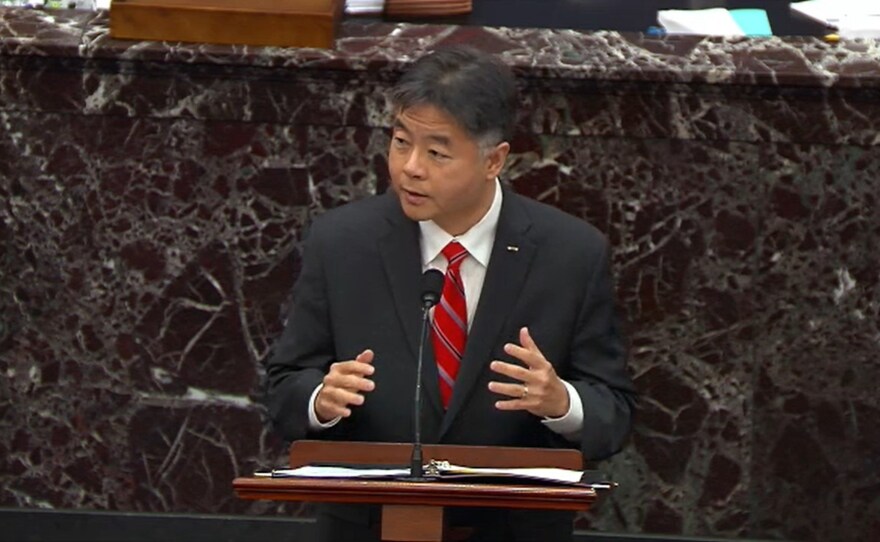Updated at 4:41 p.m. ET
Impeachment managers Thursday argued that former President Donald Trump not only incited his supporters to lay siege to the Capitol complex last month but also showed no contrition for the destruction and the bloodshed his supporters caused at his direction.
"We saw both during the attack as well as in the days after the attack that this was a president who showed no remorse and took no accountability," Rep. Ted Lieu, D-Calif., told senators.
Impeachment managers said Trump's lack of remorse indicates he remains a threat to democracy and must be disqualified from holding office.
"President Trump did not once condemn the attack," Lieu said. "Not even once."
Speaking Thursday on Fox News, David Schoen, a member of Trump's legal defense team, pushed back on that characterization.
"He's condemned the people involved. He's condemned the violence," Schoen said. "And obviously is quite offended at trying to be tied into it."
To argue their point, impeachment managers quoted Trump's remarks and showed video of the then-president during the attack and the days after. Here is a timeline of his response.
Jan. 6: Capitol is under attack
Lieu said Trump's first message to insurrectionists came three hours into the attack. He noted it came with adoration, rather than condemnation.
It was a short video, filed from the White House, in which Trump urged his supporters in the mob to "Go home. We love you. You're very special."
A few hours after that, Trump tweeted:
"These are the things and events that happen when a sacred landslide election victory is so unceremoniously & viciously stripped away from great patriots who have been badly & unfairly treated for so long."
"Go home with love & in peace. Remember this day forever!" he added.
To that, Lieu told the Senate chamber, "This is not a man who showed remorse."
Twitter blocked Trump from tweeting that same day after removing three tweets, including the video telling supporters they were "very special."
Jan. 7: Capitol Police officer Brian Sicknick dies
More than a day later, approximately 30 hours after the attack, according to Lieu, Trump released another prerecorded video. "The demonstrators who infiltrated the Capitol have defiled the seat of American democracy," Trump said. But he took no responsibility for what happened, Lieu argued.
It would be days before Trump would again publicly acknowledge the deadly insurrection, which claimed the lives of five people, including Capitol Police officer Brian Sicknick.
On Jan. 8, Twitter suspended Trump's account from the platform, saying he had repeatedly violated the company's rules.
Jan. 10: Trump orders flags flown at half-staff
"For days [Trump] did not address the nation after this attack," Lieu said. "We needed our commander in chief to lead, to unite a grieving country to comfort us."
It would be Jan. 10 before the then-president ordered flags to be flown at half-staff.
Lieu also noted that Trump did not pay his respects to Sicknick, who was given the rare distinction of lying in honor in the Capitol rotunda this month, though Trump by then was in Florida and no longer president.
Jan. 12: Trump says his speech was "totally appropriate"
In an attempt to bolster House Democrats' claim that the former president showed no remorse for the mob's rampage, Lieu replayed a video clip of Trump just before he boarded Air Force One for a trip to the border wall in Texas.
He was asked by a reporter about whether he had any role or responsibility in the attack on the Capitol.
"So if you read my speech, and many people have done it," Trump said. "It's been analyzed, and people thought that what I said was totally appropriate."
Jan. 13: Trump's Oval Office address
A full week after the carnage at the Capitol, Trump addressed the nation in a prerecorded message from the Oval Office.
"I want to be very clear: I unequivocally condemn the violence that we saw last week," he said. "Violence and vandalism have absolutely no place in our country."
Lieu argued Trump's words were not sincere.
The fourth-term congressman reminded senators that it is always clear when Trump supports an idea or action. After all, he was active on social media, "sometimes 108 tweets in a day," Lieu said.
"In public speeches and across rallies, repeating words of 'fight' and 'stop the steal' and 'never surrender.' You know what it looks like when President Trump wants to convey a message — forcefully, loudly and repeatedly he does that."
Lieu added: "This video sent a week after the attack was not that."
Copyright 2021 NPR. To see more, visit https://www.npr.org.






